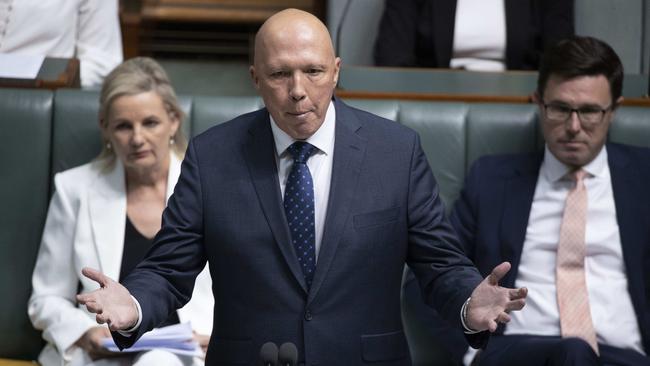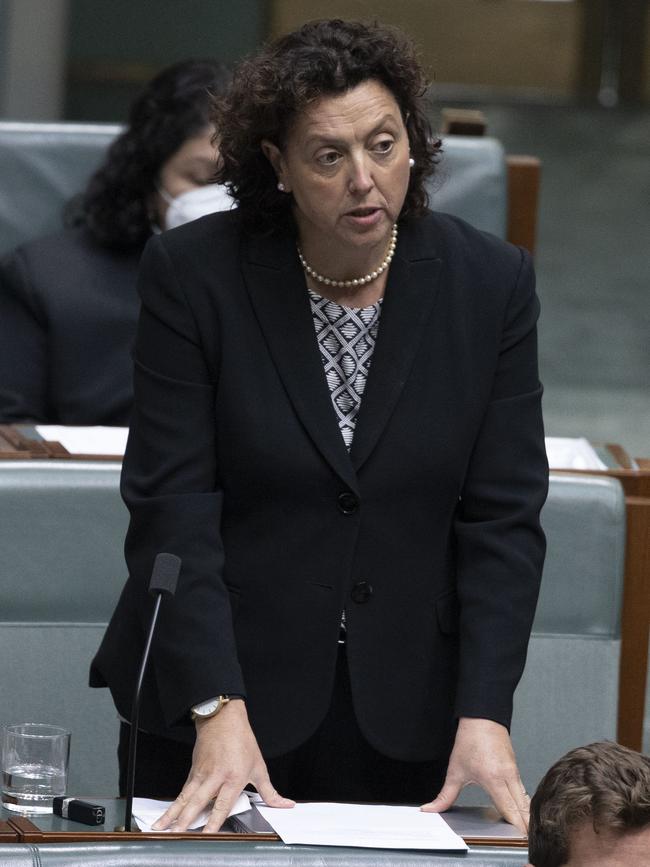James Campbell: Peter Dutton and the Liberals are facing a fight on two fronts
Peter Dutton is facing a set of political problems that no conservative opposition has ever had to deal with.
Opinion
Don't miss out on the headlines from Opinion. Followed categories will be added to My News.
Six months after he was handed one of the worst jobs in Australian politics, Coalition MPs seem to agree that Peter Dutton has done about as well as they could have hoped.
Talk to enough of them and you get the sense that even though people can find reasons they might disagree with a decision he has taken, they are, overall, happy at how he has approached things.
What pleases them is that Dutton has taken care to make sure that people feel included — or “keeping the show together”, as it is often described.
As one senator said recently: “The only thing people will notice about us for the next two years is if we are disunited.”
Dutton has two other things going for him, which, whatever other advantages they may have had, did not apply to his recent predecessors.
Firstly, he is regarded as a good bloke with a reputation for telling the truth. Secondly, it is generally accepted there is no alternative.
If that sounds like less than a full-throated endorsement, it’s not because people think Dutton has made any great strategic mistakes, it’s more a recognition that he — and by extension his MPs — need to find a solution to a set of political problems that no conservative opposition has ever had to deal with.

Never before has the Liberal Party had to fight on two fronts: a traditional battle against Labor in the suburbs and the regions, and a rearguard action against the teals, Greens and ALP in the rich urban parts of the country it until recently could rely upon.
If that wasn’t bad enough, rural Liberals and their National Party colleagues also have to be ever-alert to the danger of rural independents eating their lunch.
A couple of weeks ago, I suggested that we wouldn’t really know how many of the results in the May federal election — which saw the teals, Greens and Labor sweep through some of the nicer bits of Sydney, Melbourne, Brisbane and Perth — were caused by unique circumstances associated with the Morrison government until we saw the results of the Victorian and NSW elections.
Obviously, the results from Victoria are now in and to describe them as mixed would be extremely generous.
Though voters turned on Labor in its working-class heartland, the Liberal Party failed to break through and will still need big swings to win these seats next time.
The only good news for the Libs was that the teals failed to win a single seat.

In Hawthorn and Kew, the seats that sit inside Kooyong, which in May Monique Ryan snatched off Josh Frydenberg, neither teal got much more than 20 per cent of the primary vote. In contrast, Ryan’s primary was more than 40 per cent.
Going to the next election, however, both these state seats will be marginal. The reason is that in both of them the Labor and the Green primary vote was more than 30 per cent. In contrast, the combined Labor-Green primary in Kooyong was about 13 per cent.
The vast difference between these two results suggests that in some of Australia’s richest suburbs there’s now a substantial group of people who are not massively attached to Greens, Labor or teals.
They’ll switch between any of them, depending on which they reckon is best placed to knock over the Liberal Party.
The cunning brains inside the Victorian ALP have been quick to grasp the implications of this.
Going into May, the assumption of many people was that the ALP was running dead in teal-land because they had concluded they couldn’t win there.
But since last Saturday, more than one Labor strategist has remarked on the fact its candidates, who were representing an eight-year-old Labor government, out-polled the teals in these seats, while also increasing their vote and winning seats in the next ring of Melbourne’s suburbs.
If they can do that under these far-from-propitious circumstances, the strategists have pondered, what’s to stop them, in good time, from taking teal-land for themselves as well as targeting Aston, Deakin and Menzies — the last three seats the Liberal Party holds in the eastern suburbs of Melbourne?
Federal Victorian Liberal MPs have begun asking themselves this too. They are also nervous because the votes of Chinese-Australians, which deserted the party in May, did not come back.
They should be, because the man who is going to be fronting the federal campaign in Victoria was front and centre of the previous government’s robust attitude to China’s government.
While accepting the state Victorian Liberals had done appallingly, one senior federal MP said he doubted there were many lessons to drawn, because the chances are the economy will tank in the next couple of years.
As well, by the next poll punters will be ready to hear the Coalition’s message that the standard of living has gone backwards under Labor.
Maybe. But if this election and the federal result in May show anything, it’s that it doesn’t matter what your message is.
If the punters don’t like your leader, they’re not going to listen.
Got a news tip? Email weekendtele@news.com.au
Originally published as James Campbell: Peter Dutton and the Liberals are facing a fight on two fronts



